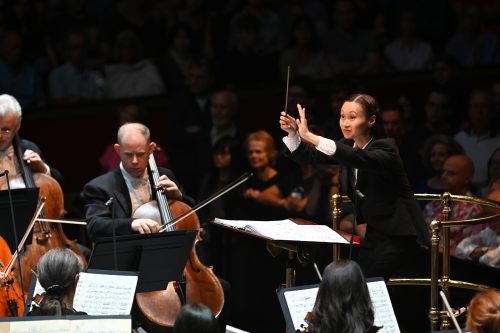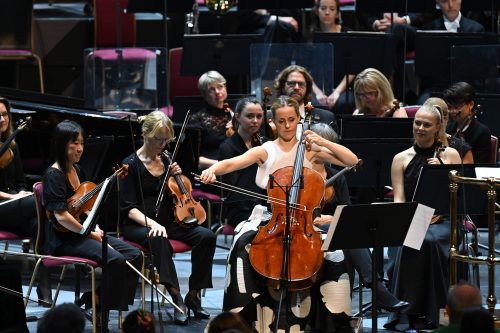


 United Kingdom PROM 38 – Dukas, Coll, Puccini, Stravinsky: Sol Gabetta (violoncello), BBC Symphony Orchestra / Tianyi Lu (conductor). Royal Albert Corridor, London, 18.8.2024. (AK)
United Kingdom PROM 38 – Dukas, Coll, Puccini, Stravinsky: Sol Gabetta (violoncello), BBC Symphony Orchestra / Tianyi Lu (conductor). Royal Albert Corridor, London, 18.8.2024. (AK)


Dukas – The Sorcerer’s Apprentice
Francisco Coll – Cello Concerto (BBC co-commission, UK premiere)
Puccini – Preludio sinfonico
Stravinsky – The Firebird suite (1945 model)
I’m overwhelmed by the massive audiences which BBC Proms live shows proceed to attract. I’m significantly astonished by the attendance at this occasion. It was a phenomenal sunny Sunday morning with a pleasing slight breeze, excellent climate for outside actions. But the massive Royal Albert Corridor was packed from prime to backside, so some 5 thousand individuals got here to hearken to a classical music live performance which included the UK premiere of a brand new cello concerto.
The programme was conceived (and marketed) as musical storytelling; it was framed by Dukas’s The Sorcerer’s Apprentice and Stravinsky’s The Firebird suite. Each compositions have been offered with prime quality musical performances however the music by itself does probably not inform the story to these unfamiliar with it. The programme notes instructed us the storyline of the Dukas composition however not that of The Firebird. Nonetheless, even when one reads the notes previous to the Dukas efficiency, it’s not straightforward to observe the plot whereas the music unfolds.
With such a big viewers of various earlier data, together with nice many kids of varied ages, it could have been very useful to have some surtitles to signpost the story.
As all Proms, this live performance too may be heard on BBC Sounds for thirty days. The Sorcerer’s Apprentice – recognisable from Walt Disney’s Fantasia – was impressed by a Goethe poem (Die Zauberlehrling). The apprentice instructions a brush to fetch some water however the broom is less than delivering the duty satisfactorily. Unable to manage the magic, the apprentice breaks the broom which multiplies into many brooms inflicting havoc. The sorcerer returns, reestablishes order and chides his apprentice.
The mild starting of the story options an oboe solo (fantastically rendered by Tom Blomfield), which is adopted by an additionally wonderful clarinet solo supply (Richard Hosford).
Conductor Tianyi Lu was economical together with her gestures, paced herself properly for the climaxes. With admirable posture on the conductor rostrum, Lu offered an fascinating and thrilling musical story.
The Firebird suite, dated 1945, is the third of the three orchestral suites which Stravinsky organized from his extremely profitable ballet of 1910. The ballet was the results of collaboration between impresario and ballet firm director Sergey Diaghilev, choreographer Mikhail Fokine, stage designer Alexandre Benois and the composer. The ballet was created for Diaghilev’s Ballets Russes and meant to be a Russian ballet. Certainly, Stravinsky’s music is stuffed with Russian motives, actual or imitated, and Russian spirit pervades the entire composition.
The ballet’s story additionally attracts from Russian folklore. The programme notes inform us the story of how the ballet Firebird happened however not the storyline of the ballet.
The story of the Firebird is set within the kingdom of the evil sorcerer Koschei who retains his topics captive. Prince Ivan occurs upon Koschei’s backyard and the Firebird, who he captures for sport however saves her life. In change, the Firebird helps Ivan to free the 13 princesses who’ve been imprisoned by the spells of Koschei. Via dancing, the Firebird casts her personal spells on Koschei and his guards, who dance themselves into exhaustion and go to sleep. The finale is the festivity of Ivan and the rescued princesses.
As with the Dukas composition, The Firebird additionally presents pretty oboe solos proper from the start, once more fantastically performed by oboist Blomfield. We heard pretty flute solos (Daniel Pailthorpe) and wonderful all essential horn solos (Nicholas Korth). Conductor Lu drew some magical pianissimos from the orchestra but additionally tight rhythms in addition to joyous ensemble celebrations.


The centre piece of the live performance was the UK premiere of Francisco Coll’s Cello Concerto, written for Sol Gabetta. The demanding four-movement piece is performed as one entity, requiring the cellist to be enjoying virtually continuous for about twenty-four minutes. Gabetta is a non-fuss, totally skilled artists of top of the range. She enters the stage with none synthetic graces, she is elegant in her outfit and stylish in her sub-servient supply of the musical materials. The composition is of the essence, Gabetta locations herself into the service of music. Coll’s concerto wants a cellist of Gabetta’s calibre.
The piece begins in very excessive positions on the cello, presenting barking rhythmic passages, not one million miles from Vivaldi’s Winter from the 4 Seasons. The rhythmic motives are current all through, both within the solo cello or within the orchestral contribution. Nonetheless, Coll offers stunning cantilena passages too for the cellist, typically in excessive positions of the devices but additionally within the decrease cello registers. The center actions are sometimes movingly stunning, the outer actions – the fourth motion particularly – are pushed by sturdy rhythmic passages. An prolonged cadence for the solo cello consists of troublesome double-stop passages but additionally goes by means of low as properly excessive positions on the cello. Gabetta performs with unforced tone, whether or not the cantilena sections or the rhythmic dance motives.
The orchestral texture is properly balanced; it by no means covers the solo cello however feeds it with comparable motives. There’s a clear dialogue between solo cello and orchestra, typically with humorous contributions (together with sliding wind motives) from the orchestra.
As an encore, Gabetta performed a solo piece written for her by Francisco Coll. A pleasant gesture in the direction of the composer and really properly performed but it surely felt like extra of the identical.
The oddity on this live performance was a Puccini piece which the composer wrote for his end-of-year examination within the Milan Conservatory. Beginning with a beautiful flute solo (Daniel Pailthorpe), the piece is a protracted aria for orchestra. Conductor Lu didn’t use a baton for this piece and allowed the orchestra to breathe with the music as a singer would.
Shanghai born however introduced up in New Zealand, Tianyi Lu studied within the UK and within the States. Despite her youth, she is in full management of the musical materials and the orchestra readily available.
Her posture is properly balanced, as are her musical interpretations in addition to her economical actions. A superb conductor to hold the torch.
Agnes Kory


